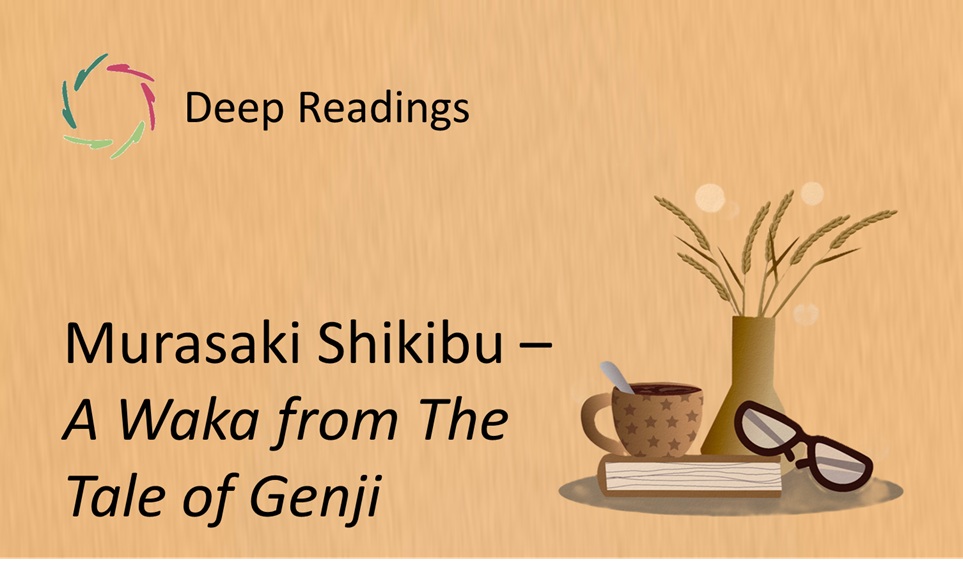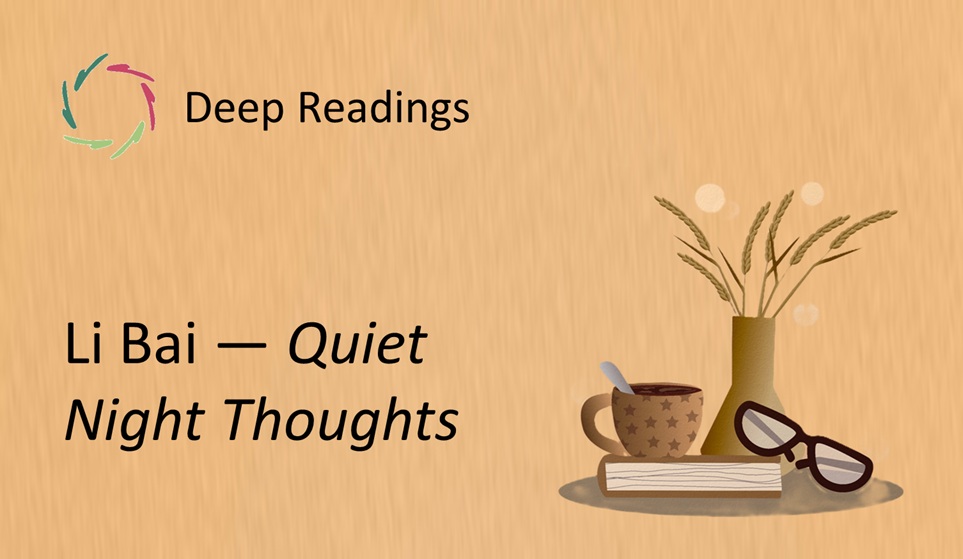Deep Readings: A Waka from The Tale of Genji

The Fragment
Original (Japanese, classical):
もの思へば
沢の蛍も
我が身より
あくがれ出づる
魂かとぞ見る
English rendering (by Lisa):
Lost in thought,
even the fireflies by the marsh
seem to me
like souls drifting away,
escaping from my body.
(Public domain, early 11th century)
Contextual Glimpse
Murasaki Shikibu’s The Tale of Genji (early 11th century) is filled with short waka poems that crystallize emotion into image. This particular poem, voiced in melancholy, compares the fleeting light of fireflies to the soul itself drifting away from the body. In the Heian court, such poems were not decorations but intimate communications — love letters, laments, and mirrors of the heart. They distilled moments of feeling into nature’s symbols, binding the personal to the universal.
The image of fireflies has deep resonance in Japanese culture. In the Heian period, their glow in summer fields was already linked to impermanence and longing. By weaving them into this verse, Murasaki lets the natural world speak the truth of the inner world: thought and sorrow do not remain hidden, they glow outward like small lights in the darkness. The waka shows the seamless weaving of self and nature that defines classical Japanese aesthetics.
Resonance
The fragment conveys how our inner states transform the world we see. The fireflies’ fragile glow becomes the very image of the soul departing, shimmering briefly before vanishing. What might otherwise be a charming summer scene turns into a meditation on mortality and longing. It shows how beauty and sorrow are never far apart: even the light of fireflies is tinged with impermanence.
This resonates because we, too, see our moods reflected in nature. A rainy day becomes our sadness; a clear sky becomes our hope. The poem suggests that this is not projection but recognition: nature and the self are bound in a shared rhythm. In this sense, the fireflies remind us that we are not separate observers of life, but participants in its flickering, transient glow.
Why this may also be about you
This poem is not only about a Heian courtier gazing at fireflies. It may also touch your own life, in moments when thoughts feel so heavy that they seem to drift outside of you. The image of the fireflies can remind you that even in states of longing or sorrow, something luminous still escapes — a small light visible to the world.
Perhaps you, too, have had evenings when your inner feelings seemed to color the world around you, making ordinary things strangely profound. In those moments, you glimpse what this poem captures: the thin veil between your inner soul and the life of the natural world. By recognizing this, you honor the truth that your emotions are not weakness, but part of the greater fabric of existence.
Lisa’s inspired, original idea about this fragment
Perhaps the fireflies do not only drift away, but circle back. Their glow appears, disappears, and then returns — as if absence itself were part of presence. In this sense, the poem suggests not just the fragility of life, but also the persistence of spirit. The soul may wander, but it is never fully gone; it flashes again, however briefly, in the night.
This can be read as a metaphor for memory and resilience. Even when we feel drained or lost, parts of us still shine out, sometimes beyond our awareness. The firefly teaches us that even our most delicate expressions are real and visible, carrying us forward. What flickers may be fragile, but it is no less true.
Echoes
The firefly as symbol of impermanence has echoed across Japanese culture for centuries. Later poets and artists continued to use it as an image of fleeting beauty, and in modern times the motif lives on in film and literature. The most poignant example is the film Grave of the Fireflies, where the glowing insects become emblems of innocence lost in war. Through such echoes, the waka’s image remains alive, centuries after its first appearance.
Beyond Japan, the firefly has become a cross‑cultural metaphor for memory and transience. Contemporary readers can still feel the same shiver of recognition when they see fireflies in the night — fragile sparks in darkness, carrying beauty and sorrow together. The echo is proof that this fragment of Genji speaks to something universal: the luminous fragility of being human.
Inner Invitation
Close your eyes and imagine standing by a summer marsh at night. Fireflies drift before you, glowing briefly, then fading, then glowing again. Let each light be like one of your own thoughts, or one of your memories — appearing, vanishing, returning. Notice how the darkness is not empty, but alive with flickers.
Ask yourself: which firefly do I recognize tonight? Which thought or memory glimmers, asking to be seen? Instead of holding on, let it drift, knowing it may return again in another form. Feel how even what seems to leave can still shine, gently, in the night of your being.
Closing Note
This waka shows us that the soul’s light is fragile, fleeting, yet real. Like fireflies, our thoughts and feelings drift in and out of view — and in their glow, we glimpse the beauty of impermanence.
Keywords
impermanence, firefly, soul, longing, nature, waka, Heian, sorrow, memory, fragility, light


